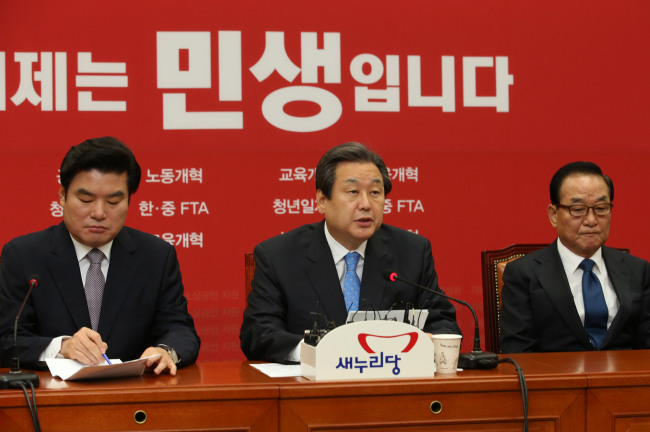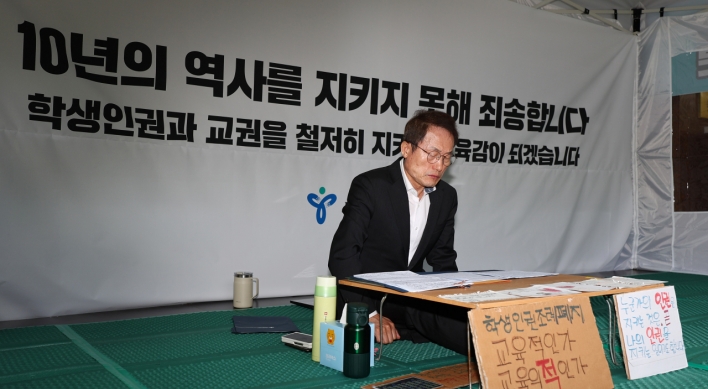South Korea’s delayed counterterrorism legislation was put back on the spotlight Monday as parties clashed over how to reinforce the nation’s intelligence agency’s ability to address rising domestic security concerns after the deadly terrorist attacks in Paris last Friday.
While the ruling Saenuri Party demanded the National Assembly enact the two-year-old antiterrorism bills to grant more authority to the National Intelligence Service, the main opposition party claimed the legislation would give too much power to an “unreliable” agency.
The Saenuri Party will hold a meeting with the government this Wednesday to discuss plans to sign into laws a total of five pending antiterrorist bills as time is running out for the 19th Assembly. Six months remain before the incumbent lawmakers finish the current term.
“We have to realize that no city in the world is immune to terror attacks. ... Even though the lawmakers have proposed antiterrorism bills, they haven’t managed to reach parliamentary committee as the main opposition has concerns over the NIS’ extended role,” said Saenuri Party leader Rep. Kim Moo-sung.

The bills aim to build an overarching agency to assess potential terror threats and implement counterterrorism policies. The NIS would lead the cross-government agency, tentatively called the “Synchronized Response Center for Terrorism,” to coordinate the government’s counterterrorism efforts.
If implemented, the government would be able to collect information on potential terror suspects to prevent and take measures against them, such as banning the suspects from entering the country or trading foreign currency. The pending bills were all submitted by Saenuri Party lawmakers.
Citing the intelligence report from the NIS last month that the NIS that two Korean nationals had reportedly attempted to join the Islamic States, Rep. Lee Cheol-woo, a former NIS official, reiterated the need for the legislation of antiterrorism bills.
“Presidential decrees issued in 1982 are all the legislation we have related to antiterrorism. If terror attacks happened on Korean soil, we would never know how to deal with that. We should stop doing nothing on the bills that most advanced nations had implemented,” said Lee in a statement on Monday.
But the main opposition New Politics Alliance for Democracy opposed the move and rebuked the bills as an attempt to extend the power of the NIS, an agency that the NPAD had claimed to have involved with illegal activities to support the government.
“Considering the NIS’ past activities, I don’t think the NIS would fulfill the role (of addressing terrorism). It is like a weak company being assigned to lead important business,” said NPAD whip Lee Jong-kul, referring to allegations against the NIS of manipulating public opinion during the 2012 presidential election.
The NPAD also cautioned that bills related to cybersecurity would pave the way for the NIS to conduct surveillance on ordinary citizens. The NPAD asserted that an independent agency, not the NIS, should overseas the government’s efforts to address cyberterrorist attacks.
“We need to create an independent body under the Ministry of Science, ICT and Future Planning as Rep. Byun Jae-ill had proposed in his draft bill. I believe (the NPAD alternative) would make terrorist threats disappear and achieve cybersecurity,” said NPAD Rep. Choi Jae-cheonon Sunday.
By Yeo Jun-suk (jasonyeo@heraldcorp.com)




![[KH Explains] No more 'Michael' at Kakao Games](http://res.heraldm.com/phpwas/restmb_idxmake.php?idx=644&simg=/content/image/2024/04/28/20240428050183_0.jpg&u=20240428180321)












![[Herald Interview] Mistakes turn into blessings in street performance, director says](http://res.heraldm.com/phpwas/restmb_idxmake.php?idx=652&simg=/content/image/2024/04/28/20240428050150_0.jpg&u=20240428174656)
